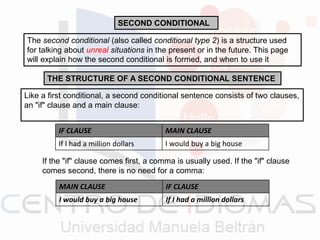
Using Adverb clauses with time
- 1. SECOND CONDITIONAL The second conditional (also called conditional type 2) is a structure used for talking about unreal situations in the present or in the future. This page will explain how the second conditional is formed, and when to use it THE STRUCTURE OF A SECOND CONDITIONAL SENTENCE Like a first conditional, a second conditional sentence consists of two clauses, an "if" clause and a main clause: IF CLAUSE MAIN CLAUSE If I had a million dollars I would buy a big house If the "if" clause comes first, a comma is usually used. If the "if" clause comes second, there is no need for a comma: MAIN CLAUSE IF CLAUSE I would buy a big house If I had a million dollars
- 2. We use different verb forms in each part of a second conditional if clause if + subject + simple past verb* main clause subject + would + verb *Note that this "simple past" form is slightly different from usual in the case of the verb BE. Whatever the subject, the verb form is "were", not "was": If I were rich, I'd buy a big house. Using the second conditional The second conditional is used to talk about things which are unreal (not true or not possible) in the present or the future -- things which don't or won't happen: Example Explanation If I were you, I would drive more carefully in the rain. I am not you -- this is unreal. Paula would be sad if Jan left. Jan will not leave -- that's not going to happen. If dogs had wings, they would be able to fly. Dogs don't have wings -- that's impossible.
- 3. USING ADVERB CLAUSES WITH TIME EXPRESSIONS These type of clauses are often called "time clauses" in English grammar books and follow specific patterns. Take a look at the chart below to study the various usage of different time expressions. Punctuation: When an adverb clause begins the sentence use a comma to separate the two clauses. Example: As soon as he arrives, we will have some lunch.. When the adverb clause finishes the sentence there is no need for a comma. Example: He gave me a call when he arrived in town.
- 4. ADVERB CLAUSES WITH TIME WHEN He was talking on the phone when I arrived. When she called, he had already eaten lunch. I washed the dishes when my daughter fell asleep. We'll go to lunch when you come to visit. 'When' means 'at that moment, at that time, etc.'. Notice the different tenses used in relationship to the clause beginning with when. It is important to remember that 'when' takes either the simple past OR the present - the dependent clause changes tense in relation to the 'when' clause. BEFORE We will finish before he arrives. She (had) left before I telephoned. 'Before' means 'before that moment'. It is important to remember that 'before' takes either the simple past OR the present. AFTER We will finish after he comes. She ate after I (had) left. 'After' means 'after that moment'. It is important to remember that 'after' takes the present for future events and the past OR past perfect for past events.
- 5. WHILE, AS She began cooking while I was finishing my homework. As I was finishing my homework, she began cooking. 'While' and 'as' mean 'during that time'. 'While' and 'as' are both usually used with the past continuous because the meaning of 'during that time' which indicates an action in progress. BY THE TIME By the time he finished, I had cooked dinner. We will have finished our homework by the time they arrive. 'By the time' expresses the idea that one event has been completed before another. It is important to notice the use of the past perfect for past events and future perfect for future events in the main clause. This is because of the idea of something happening up to another point in time. UNTIL, TILL We waited until he finished his homework. I'll wait till you finish. 'Until' and 'till' express 'up to that time'. We use either the simple present or simple past with 'until' and 'till'. 'Till' is usually only used in spoken English. SINCE I have played tennis since I was a young boy. 'Since' means 'from that time'. We use the present perfect (continuous) with 'since'. 'Since' can also be used with a specific point in time. AS SOON AS He will let us know as soon as he decides (or as soon as he has decided). 'As soon as' means 'when something happens - immediately afterwards'. 'As soon as' is very similar to 'when' it emphasizes that the event will occur immediately after the other. We usually use the simple present for future events, although present perfect can also be used.
- 6. WHENEVER, EVERY TIME Whenever he comes, we go to have lunch at "Dick's". We take a hike every time he visits. 'Whenever' and 'every time' mean 'each time something happens'. We use the simple present (or the simple past in the past) because 'whenever' and 'every time' express habitual action. THE FIRST, SECOND, THIRD, FOURTH ETC., NEXT, LAST TIME The first time I went to New York, I was intimidated by the city. I saw Jack the last time I went to San Francisco. The second time I played tennis, I began to have fun. The first, second, third, fourth etc., next, last time means 'that specific time'. We can use these forms to be more specific about which time of a number of times something happened.